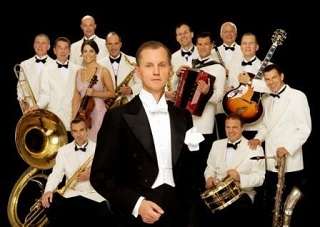|
Back
Time Travel Via Timeless Tunes New Jersey
Newark (New Jersey Performing Arts Center: Prudential Hall)
04/17/2011 -
Berlin Nocturne: German and American Songs of the 1920’s and 1930’s
Max Raabe (Vocals)
Cecilia Crisafulli (Violin), Thomas Huder (Trumpet, Vocals), Michael Enders (Trumpet, Vocals), Jörn Ranke (Trombone, Viola, Vocals), Bernd Frank (Tenor Saxophone, Clarinet), Johannes Ernst (Alto Saxophone, Clarinet), Sven Bährens (Alto Saxophone, Clarinet), Rainer Fox (Clarinet, Vocals), Vincent Riewe (Drums, Percussion), Bernd Hugo Dieterich (Bass, Sousaphon), Ulrich Hoffmeier (Guitar, Banjo, Violin), Ian Wekwerth (Piano), Michael Enders (Musical Director)
Dirk Lehmann (Lighting)

M. Raabe and Palast Orchestra (© Olaf Heine)
This was the third time I have gone to see Max Raabe and his Palast Orchestra. They were performing in Newark, New Jersey, which really is not so very far away from Manhattan. Despite the proximity, I was making my first visit to the New Jersey Performing Arts Center and I must say I was impressed. Prudential Hall is a large, imaginatively designed space, with excellent acoustics and a beautiful copper and gold-colored interior featuring elegant art deco touches. It would provide just the right atmosphere for the concert.
The lights dimmed and there they were, bathed in the blackness of evening (befitting the title of the program) and illuminated by bright gold spotlights. The haunting strains of their first song, “Heute Nacht Oder Nie,” sung by Raabe with his extraordinary keening falsetto, drifted through the hall. The spell was cast and it lingered until the end – and beyond. What a persona he has: Rail thin, impeccably groomed, his hair slicked back, impossibly elegant in his white tie and tails, He glided across the stage, tilting his head here, arching an eyebrow there, with a deadpan expression which never left his face. Max and the band and the music made me want to put on my dancing shoes. There must have been a lot of restless feet discretely and longingly dancing in the dark.
It’s a truism that nothing compares with the experience of live music. In the case of Max Raabe and the Palast Orchestra, this saying could not be more accurate. For what they do is really rather magical: They create an all-enveloping ambience, a world out of this world that draws us in and seems to carry us away to another place and time.They accomplish this so completely that when the concert ends, re-entering real life outside the hall comes as a rather rude shock.
We escape to a world that was in itself escapist: Germany in the 1920’s and early 30’s, before Hitler came to power. A world of elegance and fun. Of fabulous music and glamorous ladies and gentlemen. Of wit tinged by melancholy. Perhaps they were dancing as fast as they could to outrun what was about to engulf them. Or perhaps they were – at least for a time – simply oblivious. Of course, Hitler’s rise to power made escapism harder and actual escape necessary. Many of the composers and lyricists responsible for Raabe’s wonderful songs were Jewish; they fled or died or simply disappeared. But we have their music. As for the impossibly elegant ladies and gentlemen who danced to it, Max takes us to join them, to become fellow denizens of that world. At least until the music stops.
Raabe studied classical music in Berlin; He wanted to be an opera singer. In need of some extra cash, he and some classmates formed an orchestra to perform music they loved. This music. They had their first engagement almost 25 years ago. Now they travel the world, giving more than 100 concerts a year in countries as diverse as China, Russia and, quite recently, Israel. Raabe completed his studies and has said – with his customary dry wit – that he is a “state approved baritone.” Actually, he has a light and lovely baritone voice that he uses to stunning effect. He sings falsetto with perfect legato, but he is also able to sing low bass notes when required. His speaking voice is low and dark, almost raspy – just perfect for the sardonic tone of his summaries of the songs. Here is the preface to one: “Music has always been closely associated with personal tragedy. Who cares? As long as you are not involved.” He delivered these English summaries of German songs with just the right pauses for effect; he has superb comic timing. He also sang songs by Irving Berlin and Cole Porter – a show stopper that perfectly suited his witty but world weary manner, “Miss Otis Regrets.”
The twelve members of the orchestra are as versatile as they are talented. Particularly splendid are the violinist, Cecilia Crisafulli, and the pianist, Ian Wekwerth. But they all performed superbly, playing their diverse roles and instruments. The sound of the orchestra with the sweetness of the strings and the blending of the brass was so evocative of the big bands of the past, such as those of Glenn Miller and Tommy Dorsey. The musical highlights were too many to mention – with a range from Kurt Weill’s “Alabama Song” to an oriental fox trot called “Salome.” Near the end, Raabe sang a terrific arrangement of a song which always seemed to belong to no one but Fred Astaire -- Irving Berlin’s “Top Hat, White Tie and Tails,” with jazz riffs and a saxophone solo. He was sublime. To paraphrase another of their songs, "Cheek to Cheek,” truly, the cares that hung around us through the week seemed to vanish. In the presence of the Palast Orchestra, that is exactly what they did. Auf wiedersehen, Max. Please come back soon.
The Palast Orchester
Arlene Judith Klotzko
|